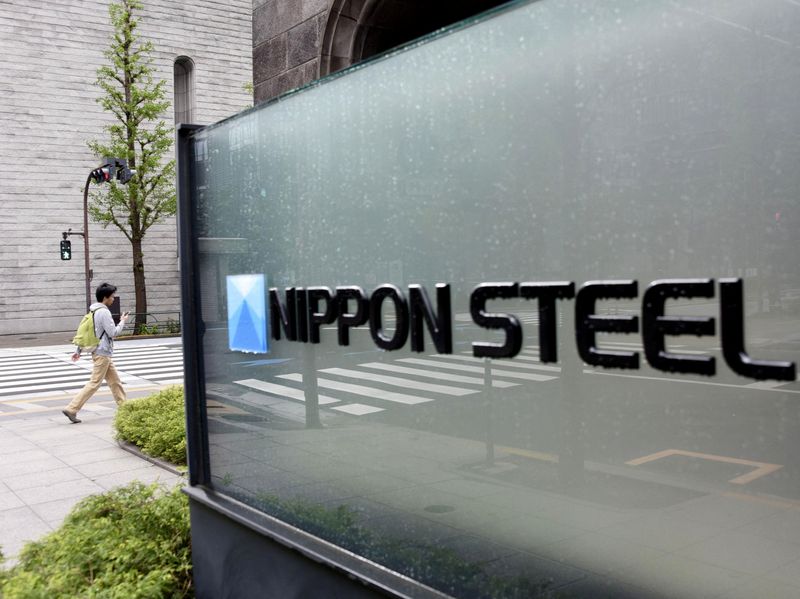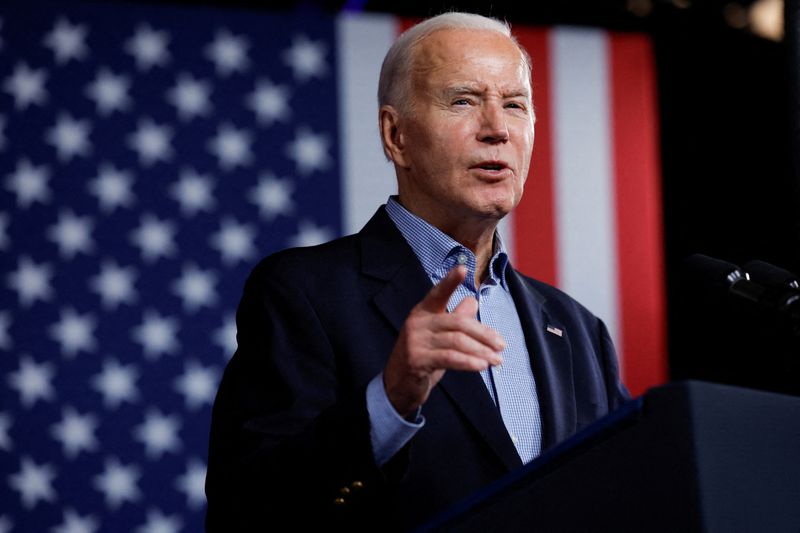By Trevor Hunnicutt and David Brunnstrom
WASHINGTON (Reuters) -U.S. President Joe Biden plans to express concern over Nippon Steel's proposed $14.9 billion purchase of U.S. Steel, a person familiar with the matter said on Wednesday, pushing the U.S. company's stock nearly 13% lower on bets the deal could face greater political opposition.
The issue has the potential to overshadow an April 10 summit between Biden and Japanese Prime Minister Fumio Kishida aimed at boosting the long-standing security alliance between their countries in the face of growing Chinese strength.
In December, Nippon Steel clinched a deal to buy the 122-year-old iconic U.S. steelmaker for a hefty premium, betting that U.S. Steel would benefit from the spending and tax incentives in Biden's infrastructure bill.
However, several Democratic and Republican U.S. senators have criticized the deal, citing national security concerns or raising questions about why the two companies did not consult U.S. Steel's main union ahead of the announcement.
Donald Trump, Biden's rival in the November U.S presidential election, has said he would block the acquisition of U.S. Steel if elected. The White House said in December the deal needed to be carefully scrutinized given U.S. Steel's core role in producing a material that is critical to national security.
The White House declined to comment on Wednesday, but a person familiar with the matter said Biden would issue a statement about the planned acquisition before Kishida arrives for his state visit.
U.S. officials and lawyers have drafted the statement and the White House has privately informed the Japanese government of Biden's decision, according to the Financial Times, which first reported the news.
Japan's top government spokesperson Yoshimasa Hayashi declined to comment on the report. "The Japan-U.S. alliance is stronger than ever, and the two countries will continue to work together ... in the field of economic security," Hayashi, chief cabinet secretary, told reporters on Thursday, echoing recent remarks by Japanese officials.
Matthew Goodman, a trade and economics expert at Washington's Council on Foreign Relations think tank, said the issue could overshadow the summit and be damaging for Kishida, who is already struggling politically at home.
"A prime minister of Japan has to demonstrate that he has the U.S. relationship not only under control, but that he's enhancing it," Goodman said. "So to the extent this runs counter to that narrative politically at home, it's problematic."
Goodman said he thought the case of the acquisition being a risk to U.S. national security was "dubious" and questioning investments from a supposedly trusted security partner could be very damaging to the relationship.
"It's much more to do with politics in an election year when both nominees are appealing to support from steel workers and unions," he said of Biden and Trump.
In a joint statement, Nippon Steel and U.S. Steel said they welcomed the Biden administration's scrutiny of the transaction, as "an objective and comprehensive review of this transaction will demonstrate that it strengthens U.S. jobs, competition, and economic and national security."
Goodman said there have been long-standing concerns in the United States about Japanese labor practices and "non-support for unionization of workers in Japanese-owned factories in the U.S. well beyond steel."
The companies said they have had "active, dedicated discussions with the United Steelworkers, which are ongoing."
U.S. Steel, founded in 1901 by some of the biggest U.S. magnates, including Andrew Carnegie, J.P. Morgan and Charles Schwab (NYSE:SCHW), became intertwined with the industrial recovery following the Great Depression and World War Two.
Last year, the Pittsburgh-based company launched a formal review of its strategic options after rebuffing a takeover offer from steelmaker Cleveland-Cliffs (NYSE:CLF).

Its shares had come under pressure following several quarters of falling revenue and profit, making it an attractive takeover target for rivals looking to add a maker of steel used by the automobile industry.
U.S. Steel shares closed 12.8% lower at $40.86 on Wednesday, well below Nippon's offer of $55 per share.
